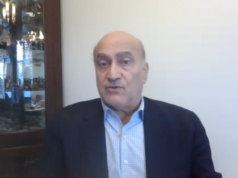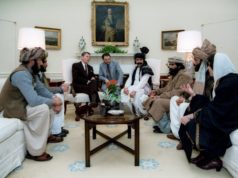In a speech Wednesday night President Barack Obama announced his plan for withdrawing American troops from Afghanistan: “…We will be able to remove 10,000 of our troops from Afghanistan by the end of this year, and we will bring home a total of 33,000 troops by next summer,” he said. “…Our troops will continue coming home at a steady pace…. By 2014, this process of transition will be complete…”
Obama’s withdrawal plan goes against recommendations made by top generals in the field. Concerned with the risks involved with withdrawing too many troops too soon, NATO commanders led by General David Petraeus urged the president to keep the bulk of the 30,000 troops he committed to the Afghan “surge” until the end of 2012. The commanders are reportedly worried they will lose the ground gained against the Taliban during last winter’s fighting.

Taliban insurgents in Afghanistan. |
The Taliban, for its part, dismissed Obama’s speech. In an English-language statement, Taliban spokesman Zabihullah Mujahid said, “[The] Islamic Emirate of Afghanistan once again wants to make it clear that the solution for the Afghan crisis lies in the full withdrawal of all foreign troops immediately and until this … happens, our armed struggle will increase from day to day.”
On Saturday, Afghan President Hamid Karzai confirmed that the U.S. is talking with the Taliban to try and negotiate a settlement to the 10-year conflict. While Washington would not confirm this, White House National Security Council spokeswoman Caitlin Hayden said that integrating the Taliban was a possibility “provided they meet the Afghan government’s long-standing red lines: renounce violence, break with al Qaeda and live under the Afghan constitution, including respect for the rights of women.”
But many Afghans believe bringing the Taliban into the government as part of a peace negotiation would be a large step backward for the country. And they are correct. The Taliban is a fundamentalist Islamist organization that, according to the U.S. Department of State, gave Afghanistan “one of the worst human rights records in the world. The regime systematically repressed all sectors of the population and denied even the most basic individual rights,” its 2001 report read.
After 10 years of fighting, even the strongest militaries on earth haven’t destroyed the Taliban. It’s hard to believe the current Afghan government will be able to protect its people against the fundamentalist group once the international coalition leaves without securing their defeat.





